6 Significant Ways Vitamin C Supports a Strong Immune System
In a hurry? Click here to read the Article Summary...
While probably everyone has heard that vitamin C is good for colds, there are many ways vitamin C supports the immune system and promotes optimal health. Read on to discover just how your body uses vitamin C and why getting your daily dose of vitamin C is a good idea.
Vitamin C, also known as ascorbic acid, is an essential water-soluble micronutrient. Essential means you can’t live without it. Since it can’t be made or stored in the body, you need to consume vitamin C regularly [1]. Thankfully, many common fruits and vegetables contain plentiful amounts of vitamin C, including:
- citrus fruits including oranges, lemons, grapefruit, and limes
- tomatoes
- potatoes
- strawberries
- bell peppers
- broccoli
- Brussels sprouts
- kiwifruit
- camu camu
However, these fruits and vegetables lose vitamin C when heated or stored for long periods of time. So, it’s important to consume them as fresh as possible and cook them very lightly, if at all.
Vitamin C Is a Powerful Antioxidant
Vitamin C has long been known to be a potent antioxidant that protects fats, proteins, carbohydrates, and nucleic acids in the body’s cells from damage by free radicals [2].
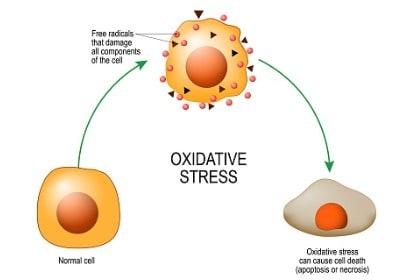
Free radicals are unstable chemicals that are made in your body during normal metabolic processes. However, they are also generated in response to environmental pollutants. An excess of free radicals, if left unchecked, can damage your body’s cells. The end result of this damage? Disease formation and aging.
Vitamin C also reinforces your body’s defenses by regenerating the dietary antioxidant vitamin E and the innate antioxidant glutathione [3].
Vitamin C and Immune Support
More than half a century of research shows that vitamin C also supports multiple aspects of our immune system [4,5]. On the other hand, vitamin C deficiency results in impaired immunity and higher susceptibility to infections.
Common Causes of Vitamin C Deficiency
Unfortunately, vitamin C deficiency is a major problem among Americans. Some of the most common reasons for this include [6]:
- poor food habits
- lifestyles that either limit intakes or increases micronutrient requirements, such as smoking and alcohol or drug abuse
- being afflicted with various chronic diseases
- exposure to pollutants
- socioeconomic factors
Smokers Need More Vitamin C Than Non-Smokers

For instance, both smokers and passive smokers have been shown to have significantly lower vitamin C levels than non-smokers. This is likely because oxidants in cigarette smoke speed up vitamin C metabolism [7,8,9].
Low Vitamin C Levels Found in People With Type 2 Diabetes
Similarly, high levels of oxidative stress caused by higher than normal blood sugar levels (hyperglycemia) may be responsible for the lower than average vitamin C levels seen in patients with type 2 diabetes [10-12].
Indeed, a systematic review and meta-analysis of 22 randomized controlled clinical trials with over 900 participants showed that vitamin C supplementation lowered blood sugar levels in patients with type 2 diabetes when taken for more than 30 days [13].
Inflammation & Infection Deplete Vitamin C Levels
Infections also deplete vitamin C levels because of the oxidative stress caused by high levels of inflammation.
For instance, patients with acute respiratory infections, such as pulmonary tuberculosis and pneumonia, have lower than normal vitamin C levels [14]. Not surprisingly, patients with acute respiratory infections given vitamin C supplementation fared significantly better than control patients [15].
The Immune System: An Overview
To understand how exactly vitamin C enhances your immunity, let’s first take a closer look at the immune system and its two basic components, the so-called “innate” and “adaptive” responses.
Innate Immunity
Innate immunity includes physical and chemical barriers, along with cellular and protein components that provide an immediate defense [16].
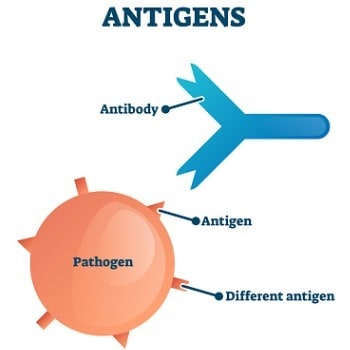
This innate response is not specific for any particular antigen, but it can differentiate between foreign entities and its host, or “self”. An antigen is any substance that causes your immune system to make antibodies against it.
An antibody is a protective protein made by your immune system in response to a specific antigen, and its job is to recognize and bind to that antigen.
Further, the innate immune response is highly conserved, even in the simplest animals, indicating that it is crucial for survival.
Adaptive Immunity
Adaptive immunity is typically seen in the immune system of higher animals, including humans. This response consists of antigen-specific reactions mediated via T-cells and B-cells. T-cells, also known as T-lymphocytes, are a type of white blood cell that help to determine the specificity of the immune system’s response to antigens.
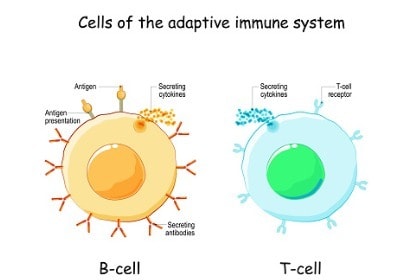
B-cells, or B-lymphocytes, are a type of white blood cell that are formed in the bone marrow. Upon encountering an antigen, they produce antibodies. Because your body contains millions of T- and B-cells, many of which carry unique receptors, it can respond to virtually any antigen.
The adaptive response is much more precise than the innate response, but it can take several days or weeks to develop. Further, the adaptive response keeps track of every antigen it encounters, so that exposure to the same antigen months or even years later leads to a rapid and vigorous immune response.
Vitamin C and Immunity
Your immune system is a complex, interactive network of specialized cells, proteins, and chemicals, which protects your body from disease-causing invaders such as bacteria, viruses, fungi, and parasites, as well as abnormal cells that arise in your own body [17].

Immune mechanisms are by necessity constantly active and therefore need to be maintained properly with energy sources and essential micronutrients to keep them in good working order [18].
Insufficient levels of vitamins, minerals, and trace elements in your body can lead to suppressed immunity. This makes you more vulnerable to infections – which, in turn, worsens your nutritional status, setting in motion a vicious downward spiral.
Vitamin C Supports Immune System Function on 2 Levels
Vitamin C plays a crucial role in supporting multiple aspects of your immune system [19,20]. Along with other micronutrients, it contributes to the body’s natural defenses on two out of three levels. Specifically, vitamin C:
- Enhances the skin’s ability to function as a physical barrier against external invaders, along with vitamins A, E, and the trace element zinc.
- Works together with vitamins A, B6, B12, D, E, and folic acid and the trace elements iron, zinc, copper, and selenium to support the protective actions of various immune cells.
In other words, deficiency of vitamin C and other vitamins and trace elements mentioned above is likely to lead to the immune system functioning less efficiently, making you more vulnerable to infections.
Next, let’s take a look at 6 key ways that vitamin C can support your immune system.
#1 – Vitamin C Enhances the Skin’s Barrier Function
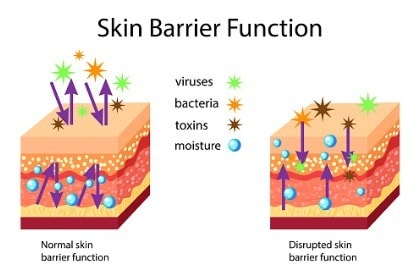
Your skin acts as a very effective barrier against bacteria, viruses, fungi, and parasites. Both laboratory and preclinical studies suggest that vitamin C enhances the skin’s barrier function [21].
For instance, we are continuously exposed to ozone. Ozone cannot penetrate our skin, but it can cause significant skin damage because of its ability to induce oxidative damage caused by free radical generation [22].
Fortunately, our skin contains relatively high levels of vitamin C, especially in the outermost layer, or epidermis, and in the layer beneath it, or dermis [23,24]. This is important for the skin to carry out its function effectively because supplementation with vitamin C has been shown to enhance the skin’s ability to neutralize free radicals [25].
In other words, vitamin C can protect against oxidative skin damage induced by environmental toxins such as ozone, especially in combination with vitamin E [26-28].
For example, along with a form of vitamin E known as alpha tocopherol, vitamin C was seen to reduce sunburn-induced skin inflammation in volunteers [29].
#2 – Vitamin C Speeds Up Wound Healing
For your skin to act as an effective barrier against external invaders, any damage, such as wounds, must be repaired quickly and efficiently. Interestingly, an acute deficiency of vitamin C – a condition known for centuries as scurvy – manifests as bleeding gums, bruising, and impaired wound healing.
These symptoms are believed to be the result of insufficient vitamin C compromising its role as a co-factor for various enzymes that stabilize collagen in the skin [30]. Collagen, the most abundant protein in the body, is one of the major building blocks of bones, skin, muscles, tendons, and ligaments, and literally holds your body together.

In laboratory experiments, vitamin C has been shown to increase the expression of wound healing mediators, speeding up tissue remodeling and wound healing [31,32].
Promisingly, supplementation with large doses of vitamin C and oral antioxidant supplements (including vitamin C) was seen to reduce the time required for wound healing in patients with pressure sores and pressure ulcers, as well as in trauma patients with disorders in wound healing [33-35].
Levels of vitamin C in the blood drop significantly after surgery, especially in surgical intensive care unit (ICU) patients, possibly because of greater demand caused by increased oxidative stress [36]. Vitamin C supplementation is recommended to normalize levels in these patients.
#3 – Vitamin C Is Essential for Neutrophil Function
White blood cells are an integral part of the immune system and protect your body against foreign invaders. They are also important for wound healing [37].
For instance, white blood cells known as neutrophils are your body’s primary defenders against invading pathogens. They have powerful antimicrobial actions, so their job is to prevent wounds from becoming infected [38].
To achieve this, neutrophils migrate to the wound site or site of infection where they literally attack and swallow invading microorganisms, subjecting them to an array of reactive oxygen species (ROS) and antimicrobial proteins to kill them.
Interestingly, neutrophils are known to accumulate relatively high levels of vitamin C within themselves. This is believed to be essential for them to carry out their functions properly, while also protecting them from oxidative stress-induced damage [39-41].
Chemotaxis Is Reduced by Vitamin C Deficiency
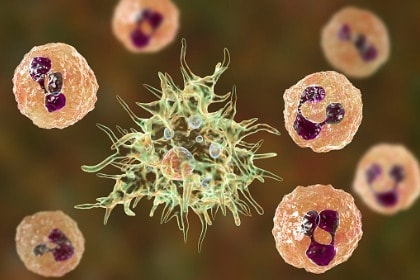
When the skin is wounded, neutrophils swarm to the wound site in response to inflammatory signals. This process of migration, known as chemotaxis, has been shown to be reduced by vitamin C deficiency [42].
Neutrophils in patients suffering from severe and recurrent infections also showed reduced chemotaxis, which was restored by high doses of vitamin C [43-45]. In general, white blood cells in patients with severe infections showed an impaired ability to get rid of invading pathogens [46,47].
After they have killed any invading organisms present, neutrophils undergo programmed cell death (known as apoptosis) and get engulfed in their turn by other immune cells known as macrophages [48].
Macrophages are large, specialized immune cells that recognize, engulf, and destroy infected, cancerous, damaged, and dead cells in the body. This process of macrophages disposing of dead neutrophils helps to end the inflammatory episode and limits the local damage neutrophils can otherwise cause to the surrounding healthy tissue. Interestingly, in laboratory experiments, neutrophils from vitamin C-deficient mice were not recognized and engulfed by macrophages [49].
Supplementation with dietary or gram doses of vitamin C has been shown to enhance many of the functions of neutrophils in healthy people, especially if they had inadequate vitamin C levels to begin with [50,51]. For instance, in a study in elderly women, supplementation with 1 gram/day vitamin C, in combination with vitamin E, was seen to enhance neutrophil functions, including chemotaxis [52].
#4 – Vitamin C Supports the Production of Lymphocytes
Lymphocytes are a type of white blood cell typically found in lymph and include natural killer (NK) cells, T-cells, and B-cells. NK cells are specialized immune cells that do not attack invading organisms directly but instead destroy the body’s cells that have either become cancerous or infected with a virus.
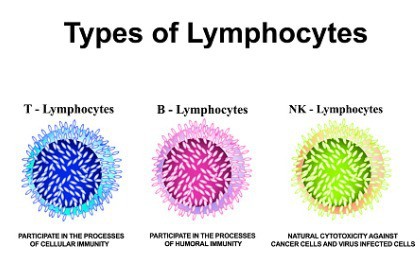
Interestingly, T- and B- cells also accumulate vitamin C within themselves, which protects them against oxidative stress-induced damage [53].
In laboratory experiments, vitamin C has also been shown to support the development and proliferation of T-cells [54-56], and NK cells [57], along with increasing the production of antibodies by B-cells [58]. For instance, supplementation with high doses of vitamin C was seen to significantly boost antibody production in young, healthy men as well as in the elderly [59,60].
#5 – Vitamin C Enhances Cytokine Expression
Cytokines are small, short-lived proteins that are secreted or released by one cell which acts on itself or another cell, thereby acting as chemical messengers.
Once secreted, a cytokine binds to a specific protein molecule, known as a receptor, on the surface of its target cell, triggering a signaling cascade. This signal ultimately reaches the nucleus of the cell, resulting in changes in gene and protein expression that changes how the target cell functions.
Cytokines play an important role in reproduction, growth and development, and injury repair, and especially in the immune system. Cytokine production by immune cells in response to infection and inflammation trigger the maturation, growth, and responsiveness of specific immune cell populations [61].
Cytokines can be either pro- or anti-inflammatory. In laboratory experiments, vitamin C has been shown to enhance the expression of some cytokines while lowering the expression of others [62].
#6 – Vitamin C May “Detoxify” Histamine
If you have allergies, you’re likely very familiar with histamines and their effects. Histamine is a compound that’s involved in local immune responses and inflammation. It’s made by certain types of white blood cells in the body in response to antigens in the case of allergies as well as in response to infectious pathogens.

Histamine causes capillaries – thin-walled blood vessels located just under the skin – to become dilated and leaky.
Laboratory studies in animals show that vitamin C depletion is associated with higher histamine levels, and that supplementation with vitamin C lowers histamine levels, indicating that vitamin C may act to “detoxify” histamine [63-65]. Healthy men and women given vitamin C supplements also showed lowered histamine levels [66,67].
Can Vitamin C Actually Prevent Colds?
Does taking large doses of vitamin C protect against the common cold? That was the important question that researchers from the Cochrane Collaboration (a prestigious international network of researchers) set out to answer in a study published in 2013.
The researchers analyzed 29 studies involving more than 11,000 children and adults [68]. Unfortunately the conclusion they came to was “no” – taking vitamin C doesn’t prevent you from getting a cold. They also found that starting to take vitamin C after becoming sick with a cold also didn’t have an impact.
What the research did reveal, however, is that:
- taking vitamin C every day over a longer period of time shortened the period of illness by about 10%,
- and those cold symptoms were also milder in people who always took vitamin C.

Interestingly, when people exposed to short periods of very strenuous physical activity in extremely cold temperatures – such as marathon runners or soldiers doing winter exercises – started taking vitamin C two to three weeks beforehand, their risk of getting a cold was seen to be reduced by about 50%.
The researchers had this to say about their findings, which only looked at placebo-controlled trials testing 0.2 g/day or more of vitamin C.
“Given the consistent effect of vitamin C on the duration and severity of colds in the regular supplementation studies, and the low cost and safety, it may be worthwhile for common cold patients to test on an individual basis whether therapeutic vitamin C is beneficial for them [69].”
Finding the Best Source of Vitamin C
Generally, daily supplementation of 100-200 milligrams (mg) of vitamin C is considered sufficient.
Each serving of new Organixx Immunity 3 provides you with 110 mg of whole food (not synthetic) vitamin C from organic camu camu grown in the Amazon rainforest.
This 3-in-1 immune support supplement also includes 200 mg of organic elderberry which has potent antiviral and antimicrobial properties, along with 15 mg of zinc from two forms (zinc arginate & zinc glycinate) for better absorption and higher tolerability.
Organixx Immunity 3 gives you natural immune system support against harmful viruses & bacteria, including the common cold, influenza, and sinusitis. This ultimate 3-in-1 immune support supplement provides 3 powerhouse nutrients in one convenient daily formula: organic camu camu (vitamin C), organic elderberry & 2 forms of zinc.
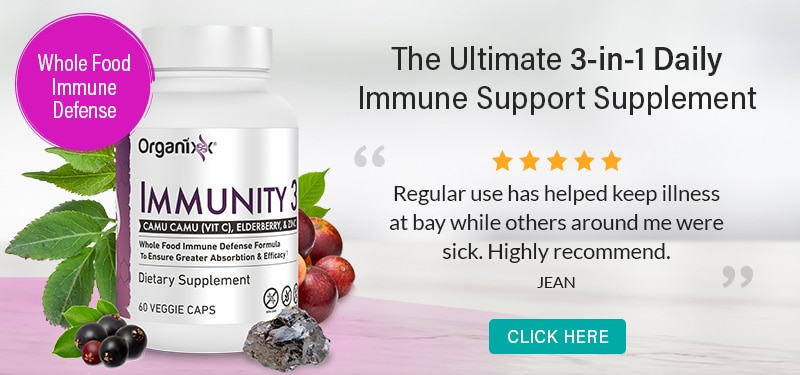
 Sources:
Sources:
Article Summary
Vitamin C, also known as ascorbic acid, is an essential water-soluble micronutrient that you can’t live without. Since it can’t be made or stored in the body, you need to consume vitamin C regularly.
Vitamin C is an antioxidant and supports multiple aspects of the immune system. Being deficient in vitamin C results in impaired immunity and higher susceptibility to infections.
Vitamin C deficiency is a major problem among Americans for a variety of reasons, including poor diet, exposure to pollutants, chronic disease, and infection. Smokers and people with diabetes are two examples of people with low vitamin C levels.
Your immune system is a complex, interactive network of specialized cells, proteins, and chemicals, which protects your body from disease-causing invaders such as bacteria, viruses, fungi, and parasites, as well as abnormal cells that arise in your own body.
Vitamin C plays a crucial role in supporting your immune system in 6 key ways:
- Enhances the Skin’s Barrier Function
- Speeds Up Wound Healing
- Is Essential for Neutrophil Function
- Supports the Production of Lymphocytes (a type of white blood cell)
- Enhances Cytokine Expression
- May “Detoxify” Histamine
Each serving of new Organixx Immunity 3 provides you with 110 mg of whole food (not synthetic) vitamin C from organic camu camu grown in the Amazon rainforest, along with two other powerful immune support nutrients: organic elderberry and zinc.


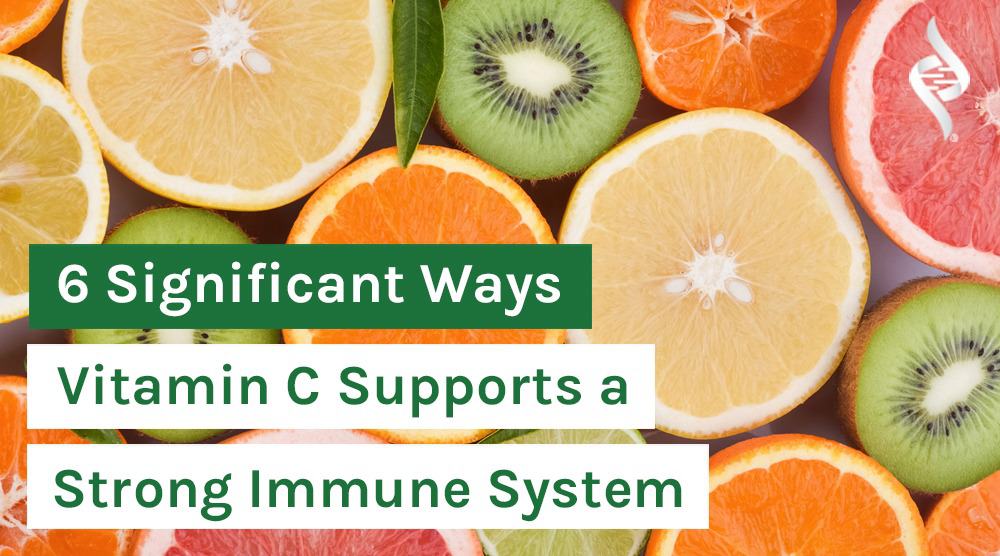


VERY INFORMATIVE AND ENLIGHTENING
Hi Michael, We are always thrilled to know when our information has been helpful. Thank you for the positive feedback. Wishing you a wonderful day!
Thank you for sharing this informative article. Very timely.
Hi Tara! Thank YOU for being here with us. We appreciate your support. Have a wonderful day!
thanks, It is a piece of good information.
We're glad you found this article informative, Banchong. Thank you so much for being here with us!